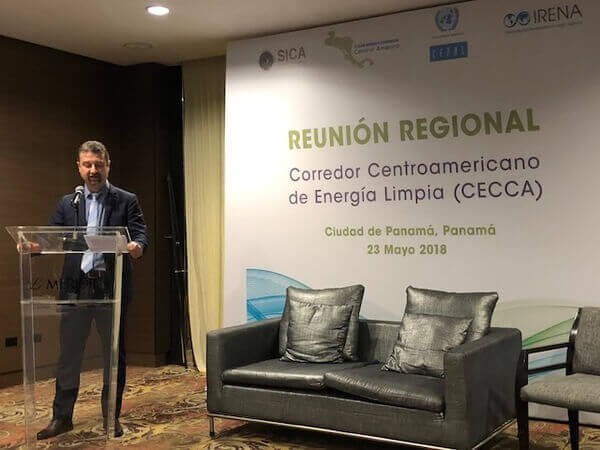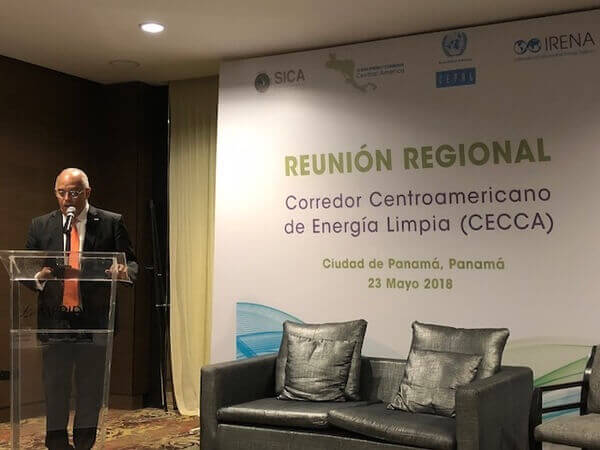News Release from International Renewable Energy Agency IRENA
Wind Industry Profile of
Central America Progresses Towards Development of Clean Energy Corridor
The increasingly competitive cost of power from renewable sources, coupled with growing energy demand in countries with strong economic growth makes a compelling case for the adoption of renewable energy.
To stimulate the investments necessary for a long-term sustainable energy pathway in the region, grid stability and system reliability must be guaranteed – something a regional transmission network can facilitate. To that end, the Clean Energy Corridor of Central America (CECCA) – a region wide initiative facilitated by the International Renewable Energy (IRENA), is designed to support the penetration of higher shares of renewables in national power systems and the regional grid, and promote cross border trade of renewable power.

Gurbuz Gonul, IRENA, speaks to the workshop
As a follow-up to a series of capacity building and technical advisory activities held in Central America over the past two years, regional stakeholders met last month in a CECCA regional consultative event, co-organized by IRENA, the Central American Integration System (SICA) and the Economic Commission for Latin America and the Caribbean (ECLAC). The workshop was attended by government officials and senior representatives from across central America, offering attendees an opportunity to chart the initiative’s progress and agree on the path forward.
“IRENA designed the CECCA in coordination with governments of the region to align with strategic plans for the regional electricity market,” said Gurbuz Gonul, Acting Director of Country Support and Partnerships at IRENA. “However, this initiative’s broader impact may go beyond the progress of renewable energy in Central America to establish a framework for global energy transformation.”
Much of the work completed thus far under the initiative has focused on addressing issues related to the design and implementation of variable renewable energy power purchase agreements (PPAs) in Central America, and challenges associated with the integration of solar and wind energy into the grid. “Variable renewable energy integration has rapidly expanded in the electricity systems in the region but there are still barriers to overcome, including the lack of regulation and coordination,” said Vanessa Interiano, Senior Adviser at IRENA. “Progress has been made and we are heading in a positive direction, however, an initiative of this scale requires a careful and methodical approach, consolidating learnings at each stage.”
Two key areas were identified as being for immediate action:
1. Further capacity building support needed on network analysis software
Following a gap analysis carried out by IRENA (May 2017) for Panama’s power system operations and planning, several priority areas for support were identified, one of the key areas being transmission system planning and variable renewable energy generator modeling. To meet this need, IRENA carried out training (Oct. 2017) for Panama’s power system operators on the use of network analysis software to assess the impacts of integrating high shares of solar and wind energy on the stability of the national power system.
As an outcome, IRENA identified further potential areas of support for system operators, both in Panama and other CECCA countries, related to system modelling, advanced grid codes and operational procedures. Such support will be factored into upcoming activities.
2. Advisory support expanded to improve renewable energy investment climate
The regulatory component of CECCA focuses on ensuring that an attractive investment climate exists for renewable energy, and that solar and wind PPAs operate on a level playing field vis-à-vis conventional power generation. Under current frameworks, investment incentives for variable renewable energy are limited.
IRENA, in close coordination with the National Secretariat of Energy of Panama and in consultation with domestic and international investors, developed a financial assessment model to assess the renewable energy investment climate in Panama. IRENA is now in the process of developing practical recommendations to inform the ongoing review process of investment conditions, and use the model to raise local investors’ awareness regarding investment risks associated to wind and solar PV. The model can be further developed and tailored to the needs of the countries of the CECCA region.
The path forward
Drawing on lessons learned and feedback received from the regulatory and technical components of CECCA, the initiative will now move beyond its pilot-country phase to support renewable power deployment across the region. The initiative will aim to extend implementation of the PPA assessment model across the CECCA region through regionalised VRE technical training for national power system operators.

Ángel Cano speaks to the workshop
Simultaneously, and in line with the implementation pillars of the initiative, the meeting discussed additional potential areas for joint action including renewable energy project facilitation, resource assessment and long-term planning, all of which will take place under the guidance of IRENA. “The support and cooperation of IRENA is very important to reach the objectives of CECCA,” said Ángel Cano, Executive Director of the National Commission of Energy of Dominican Republic, and SICA Pro-Tempore Presidency.
- Source:
- IRENA
- Author:
- Press Office
- Link:
- www.irena.org/...
- Keywords:
- IRENA, Central America, El Salvador, Costa Rica, Panama, solar, wind, expansion, climate change

























